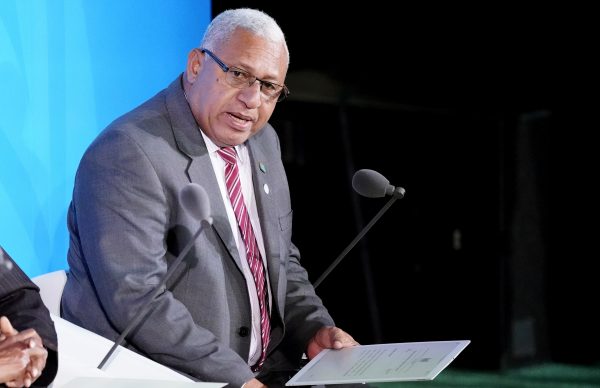While still highlighting the government’s role in promoting growth over the previous decade, the 2019 National Budget — delivered by the Attorney-General and Minister for Economy, Civil Service and Communications Aiyaz Sayed-Khaiyum — also stressed a scaling back in Government expenditure.
Unsurprisingly, the opposition parties — the Social Democratic Liberal Party (SODELPA) and the National Federation Party (NFP) — continued to attack the government on lines that harkened back to their 2018 election campaigns. They argued that the incumbent’s profligacy with government expenditure led to cuts, growing unemployment and underemployment, impoverishment and inequality and corruption in the allocation of government funds. NFP leader Biman Prasad typified this line of objection in his reply speech that repeated last year’s criticism, describing the government as ‘spending money like drunks in a nightclub’.
But 2020 will be different in at least one important respect: it will be one year closer to the next election for a prime minister that will have been in office, unelected and elected, since 2006. The current FijiFirst government was returned in 2018 with a considerably reduced majority amid signs that, despite being able to vastly outspend party opponents during the campaign, its strengths had become weaknesses.
FijiFirst is a pyramid built upon a very narrow base, dependent largely on the leadership of Bainimarama and Sayed-Khaiyum for popular support. As a party machine, FijiFirst was clearly less well organised than its opponents, especially SODELPA.
During 2019, there have been instances when the Prime Minister’s carefully crafted PR image has cracked. This crafting has tried to reinforce a highly personalised form of leadership. But with budget cuts, the two ‘Mr Fix-it’ leaders who stress their personal accessibility to voters will have a much more difficult time rebuilding popular support.
Similarly, while the government’s capacity to repress opposition remains powerful, there are signs that criticism is now more open and direct — both in Parliament and outside, including on social media. The 2019 reply speeches by two of the next generation of party leadership aspirants were particularly scathing of the government. Fiji’s long-running tradition of having unarmed police, for example, has been a subject of open, often heated discussion. And even though most websites are often officially monitored, social media is replete with criticism of the effect of budget cuts for social services.
The trenchant parliamentary attacks on the government by SODELPA MP Mosese Bulitavu and NFP MP Lenora Qereqeretabua also point to limits in the opposition parties. With SODELPA leader Sitiveni Rabuka up for re-election after the party’s failure to win in 2018, a long-running sore over its future direction remains open and festering.
Bulitavu is a younger representative of the taukei (indigenous Fijian) fundamentalist wing of SODELPA, once embodied by a chiefly leadership. He is opposed to almost all of the reforms expressed in the 2013 military government-constructed Constitution, including the removing of distinctions between taukei and Indo-Fijians.
He is also prone to expressing ‘send the vulagi (foreigners or Indo-Fijians) back to where they came from’ sentiments, popular among some taukei circles. Central to his platform are the placing of Christianity ahead of secularism in official standing and removing the changes to land law that diminished the power and reduced the rental incomes that prioritised chiefs over other mataqali (land-owning) members. Demanding that the 2014 party manifesto remain sacrosanct marked Bulitavu as a challenger to Rabuka in his attempts to straddle SODELPA’s distinct wings.
While Qereqeretabua’s challenge to the NFP leadership is less overt, as a younger professional woman with a national beauty pageant triumph and family commercial success bolstering her standing, she embodies a rapidly changing electorate. Although taukei, she and the party’s deputy leader Pio Tikoduadua represent a shift within the NFP which might assist in reducing the perception that it is primarily an Indo-Fijian party. Alongside Lynda Tabuya, another taukei professional woman and the second-highest vote winner in 2018 for SODELPA, Qereqeretabua has been prominent in challenging norms about parliamentary dress and language, as well as the government’s authoritarian rule.
If the Fijian economy undergoes a major downturn because of domestic forces or international conditions, including reduced tourist numbers, this could be expected to exacerbate the government’s difficulties. Growing poverty and unemployment are likely to heighten criticism by its party opponents and fuel popular opinion against an ageing government. Heightened repression or attempts to widen FijiFirst’s base through internal reform are two possible directions worth watching in 2020.
Scott MacWilliam is a Visiting Fellow at the Department of Pacific Affairs, the Australian National University. Recent publications include Modernising Tradition: Elections, Parties and Land in Fiji (DPA DP 2019/2) and The Search for Democracy in Fiji (DPA DP 2019/3).
This article is part of an EAF special feature series on 2019 in review and the year ahead.

